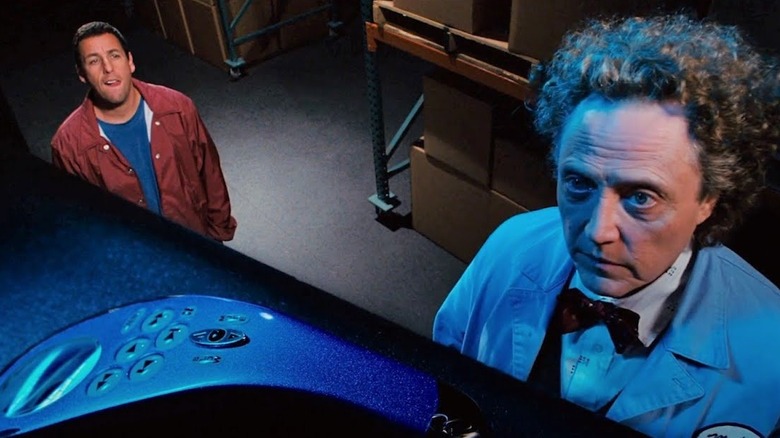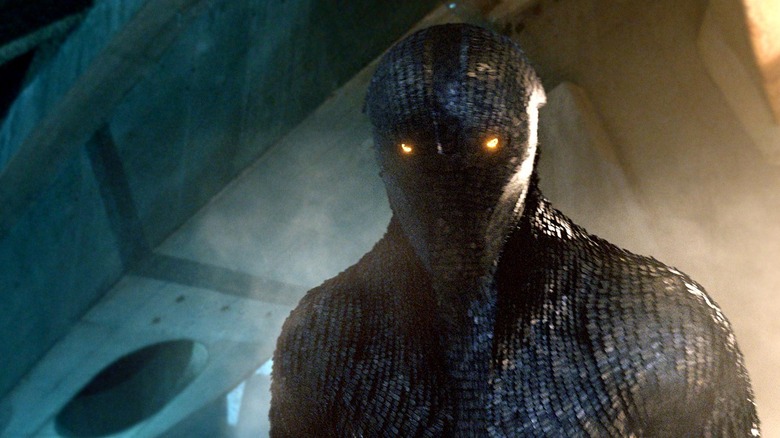What These Movies Predicted About 2023
You don't need to be a psychic with supernatural abilities or even own a shiny prognosticating crystal ball to predict the future. All you really need to be is a screenwriter with a laptop and a lot of strong black coffee (and maybe a studio willing to invest tens of millions of dollars into your big idea). Filmmakers have been predicting the future since the days of Georges Méliès ("A Trip To The Moon") and Fritz Lang ("Metropolis"). While some of their predictions have proved prescient (humanity did indeed make it to the moon), many others haven't panned out. The robot uprisings predicted in "The Terminator," "The Matrix," and dozens of other dystopian movies, thankfully, haven't come to pass (yet). Now, we come to 2023, and based on the movies, this year is set to be a doozy.
What can we expect? Just your usual assortment of apocalyptic annihilations, alien invasions, societal breakdowns, and time travel shenanigans. Why doesn't any filmmaker ever predict a pleasant future? Beats us. We also don't know why many of these films chose "2023" for their setting other than it sounds more legit than "vague time in the not-too-distant future." Well, the new year is here, so let's find out what these movies predicted for 2023!
Click
The boldest prediction "Click" could have made was that its star, Adam Sandler, would become a well-respected actor in 2023. We kid, we kid. The 2006 film follows Sandler's super-profitable schtick from the aughts (Adam Sandler + wacky concept = money). In this case, the concept finds Adam Sandler playing an overworked architect named Michael Newman, who is bestowed by the mysterious Morty (played by appropriately kooky Christopher Walken) with a TV remote control that gives him god-like abilities to manipulate time and reality. You probably can't pick that up at Best Buy, but we haven't checked (actually, Newman gets the universal remote at Bed, Bath & Beyond).
While Newman wanted a remote to control his TV and DVD player (groundbreaking tech in the pre-streaming era), his all-powerful remote can pause, rewind, and fast-forward the events in his life. Because this is an Adam Sandler movie, Newman uses this remote for silly and selfish ends such as slapping his boss (played by David Hasselhoff) across the face. However, because "Click" is also a more humane Sandler movie than most, it also tackles serious subject matter, such as the scene in which Newman fast-forwards to 2023 where he sees that his father has died after Newman rudely rebuffed him, and Morty reveals himself to be (surprise!) the Angel of Death! While there are no all-powerful remotes in 2023 like "Click" predicted (or 2006, for that matter), the TouchSense universal remote does have a touch-screen, so that's pretty cool.
Don't Breathe 2
In the 2016 film "Don't Breathe," three thieves make the mistake of breaking into the home of a blind man. However, they soon find out that the blind man is former Navy SEAL Norman Nordstrom (Stephen Lang), and he's anything but helpless. If the thieves had seen "Avatar," they would have thought twice before busting in on Stephen Lang. The film is vaguely set in 2015 or 2016, while the sequel, "Don't Breathe 2," is set roughly eight years later, placing it around 2023, which co-writer and director Fede Álvarez confirmed in an interview with Forbes.
So what has happened to Nordstrom in the intervening years? Well, he's raising a young girl to recreate his former family life, but when the girl is kidnapped by criminals, Nordstrom is forced to go full John Rambo to rescue her. Basically, it's "Commando" crossed with "Daredevil." Of all the films on our list, "Don't Breathe 2" is one of the most believable, as it's simply set in the future, not about the future. Because the precise 2023 setting is incidental and not intentional, the future that "Don't Breathe 2" predicts is pretty much like our world today. However, the well-worn "blind badass" trope, which goes back to "The Tale of Zatoichi," happens to be true. Take, for example, blind martial artist David Black, who is highly skilled in aikido and jiu-jitsu. We strongly advise thieves to not break into his house.
Eternals
While the events of "Eternals" span thousands of years, the main plot of the film takes place in 2023. The 2021 film teaches us that the universe (well, the Marvel Cinematic Universe) has been watched over by an ancient alien race known as the Eternals since the dawn of civilization. The Eternals have guided and protected humankind from its rise from the stone age to the modern day. These Eternals are themselves the greatest creation of the Celestials, a group of cosmic beings who want to eliminate all life on the planet by using Earth to birth a new member of their godly guild.
Whether it's set in 2023 B.C. or 2023 A.D., the prediction that humankind will discover that we've been guided by an advanced alien race is pretty preposterous — depending on who you ask. The popular History Channel program "Ancient Aliens" has been making that assertion since 2009. However, mainstream archaeologists say its claims that ancient civilizations were the handiwork of extraterrestrials is pseudo-science. Maybe this advanced super-civilization doesn't have to be extraterrestrial. This is the premise behind "Ancient Apocalypse," which theorizes that the survivors of an advanced ancient human civilization wiped out by a cataclysmic flood spread their knowledge to early hunter-gatherers. While "Ancient Apocalypse" made it to the top 10 on Netflix, its claims have also been roundly ridiculed by archaeologists. So barring some extraterrestrial revelation, the predictions made by "Eternals" are less than "Marvel"-ous.
The Purge: Anarchy
"The Purge" is a five-film franchise and two-season TV series that predicts a near-future America that observes an annual event in which all crime is legalized during a 12-hour period. In the sequel, 2014's "The Purge: Anarchy," Frank Grillo plays an off-duty LAPD police sergeant who takes four innocent people under his (heavily armed) wings to protect them during the annual purge, taking place on March 21, 2023. While we hope a purge never happens in the future, it did happen in the past.
The pre-Christian Roman pagans celebrated a festival called Saturnalia, during which citizens could basically do whatever they wanted and were encouraged to act out their desires without fear of legal consequences, leading to violence, vandalism, and murder. However, in ancient Rome, the laws weren't suspended for just 12 hours but for a whole week from December 17th to the 25th. And you thought your office holiday party was wild!
Thankfully, that was just the past, right? Well, in September 2022, TikTok was abuzz with fears of a real-life purge in Illinois, based on the Prairie State's impending passage of the SAFE-T Act on January 1, 2023, so maybe not.
X-Men: Days of Future Past
"X-Men: Days of Future Past" predicts a dystopian future in which mutants are hunted down by killer robots known as Sentinels. This bleak future is set off by events that took place in 1973 when the Sentinels' inventor was murdered by the mutant Mystique, who is subsequently captured so that her shape-shifting DNA can be used to create the mutant-slaying machines. Because of his super-healing abilities (and let's be honest, because he's by far the most popular character), Wolverine is sent back in time (using the time travel logic of "let's change the past to fix the future" popularized by "The Terminator" and "Back To The Future") to stop this from happening,
Since there are no mutants, there are no mutant-hunting robots. Therefore, mutants don't have to go back in time to stop them. Still, how plausible is any of this? CRISPR DNA technology could lead to people with superhuman abilities, but these would be more like Captain America powers, not Storm, Cyclops, or Magneto powers. That said, there are already people who have gene mutations that give them special abilities such as super-dense bones or vision beyond 20/20. What about killer robots? The San Francisco Police Department petitioned to have robots that could use lethal force, while so-called "killer robots" have already arrived in the war in Ukraine. Superhumans versus killer robots actually could happen one day.
Texas Chainsaw Massacre (2022)
Netflix's "Texas Chainsaw Massacre" is a legacy sequel to "The Texas Chain Saw Massacre" and takes place 50 years after the events original, placing the 2022 film in 2023. (Although the original was released in 1974, the opening crawl of "The Texas Chainsaw Massacre 2" asserts that the events of the first film take place in August of 1973.) "Texas Chainsaw Massacre" is the ninth film in the franchise, and predicts a future that sounds just like the other eight films in the series: A group of innocent teenagers runs into the sadistic serial killer Leatherface, who murders them one by one. If you've seen one, you have seen them all, as this film's dismal critical and audience reception keeps it from being one of the best legacy sequels. "Top Gun: Maverick," this is not.
Despite being an over-the-top horror movie, "Texas Chainsaw Massacre" makes the most accurate predictions of any movie on our list because its story about a serial killer slaughtering a bunch of innocent people has already happened ... many times. While the exact events of "The Texas Chain Saw Massacre" are purely fictional, the film is based in part on the real-life murderer, Ed Gein. Gein lived in Wisconsin, not Texas, and only killed two people (Leatherface says, "Hold my chainsaw"). However, he was a notorious grave robber who made decorations out of the desecrated bodies he dug up. Gein also inspired Alfred Hitchcock's 1960 film "Psycho" and, possibly, Jeffrey Dahmer as well. Here's hoping that if they make another Ed Gein movie in 2023 (or whenever), people won't thirst after "The Plainfield Ghoul" the way they did Dahmer and Ted Bundy.
The Tomorrow War
"The Tomorrow War" begins in December 2022 and predicts that people from the future will arrive to warn the planet about an impending alien invasion. The future people train present-day soldiers throughout 2023 to travel to 2051 to fight the invaders. So how likely are the predictions of time travel and interplanetary invasion made by "The Tomorrow War"? According to the laws of physics, time travel is possible (in a theoretical sense) but only to the future, not back to the past. So "The Tomorrow War" got the part about traveling forward in time right, but not the part about people being able to go back to the past. How does time travel work in theory?
Technically, we're all traveling forward through time every second of every day. According to special relativity, if we move really fast, say the speed of light, time will slow down, allowing us to travel farther into the future, presumably so we can fight aliens. But what is the likelihood that those aliens could arrive here or that they even exist? While it is possible, the aliens would have their work cut out for them, as it has been calculated that it would take the nearest potential alien lifeform 20 years traveling at the speed of light to arrive here. Hopefully, any alien making that celestial trip packed a thick book and plenty of snacks.
Alien Rising
Released in 2014 and set in 2023, "Alien Rising" (aka "Gemini Rising") tells the story of a former Homeland Security agent sent to a remote island by the military to study alien technology. However, she must stop them once she discovers that her boss, Col. Stephen Cencula (Lance Henriksen), is not only keeping an alien prisoner but plans on using extraterrestrial tech to create a mind control serum to sell to a North Korean billionaire. According to the film, the going rate for an alien mind control serum is $4 billion, about $40 billion less than what Elon Musk paid for Twitter, so we bet Col. Cencula could have haggled for a lot more.
Let's be honest. If you're working for Lance Henriksen, you know he's up to no good, so that's by far the most outlandish part of the movie. Yet, it turns out this schlocky sci-fi film's predictions about the government using mind control as a weapon may not be that far off, as the CIA performed human experiments in mind control in real life. Dubbed MK-ULTRA, the CIA's super-secret mind control program may not have used alien technology to control people's minds, but it did incorporate everything from electroshock to high doses of LSD. MK-ULTRA was eventually shut down, but not because it literally killed people. The program's head, chemist Sidney Gottlieb, concluded mind control isn't possible. It's a good thing Gottlieb never got his hands on alien tech.
Gunbuster
Even die-hard anime fans may have never heard of "Top wo nerae!" ("Aim for the Top!"), better known in the west as "Gunbuster." However, the six-episode anime series, released in 1988, is highly influential and features the directorial debut of Hideaki Anno, who would go on to create the 1995 anime series "Neon Genesis Evangelion" and direct "Shin Godzilla," winner of seven Awards of the Japanese Film Academy, including best picture and best director. Set in 2023, the "Gunbuster" series predicts a future in which female space cadets pilot powerful mecha known as "Gunbusters" to battle Space Monsters (that's literally what they're called), insectoid aliens bent on annihilating the galaxy.
"Gunbuster" was groundbreaking for featuring female pilots and showcasing their personal problems. Anno would perfect this formula seven years later in "Neon Genesis Evangelion." Alas, its predictions of a future featuring "Mechs vs. Space Monsters" is pretty far off. Even in the unlikely event of an alien invasion, humanlike robots probably wouldn't defend us. Yes, the bipedal form is a great ergonomic design — for relatively small humans. However, for robots that are at least 10 feet tall and weigh thousands of pounds, the dexterity required to move a bipedal body and the energy required to power it mean that mechs would not make for a very practical solution in warfare. That said, "human-piloted exoskeletons" could one day be used for moving cargo and constructing buildings, but we're not likely to ever see mechs facing off against insectoid aliens.
Avengers: Endgame
"Avengers: Infinity War" ends in 2018, and the events of "Avengers: Endgame" take place five years later. Using kindergarten-level math, that places "Endgame" in 2023. So what can we expect? "Avengers: Endgame" predicts a future in which half of all life in the entire universe has been erased from existence by a malevolent demigod with six magical stones housed in an all-powerful gauntlet. So there's that. The good news? A team of superheroes has devised a clever scheme to travel back in time and recover the stones to reverse the Mad Titan's schemes.
Believe it or not, the time travel plot of "Avengers: Endgame" is the most scientifically plausible part of the film. Unlike many time travel movies, which propose traveling back in time to alter a shared future (looking at you "Terminator"), "Avengers Endgame" argues that traveling back in time only affects that individual timeline. Hence, the team didn't just travel back to Thanos' crib to smother him as a baby (that would be pretty mean). While this time travel theory is more likely than, say, "Back To The Future," most modern physicists argue you can only time travel forward into the future, not back into the past. Time travel is a one-way trip because once you've arrived in the future, you're not getting back — even if you're Iron Man.










